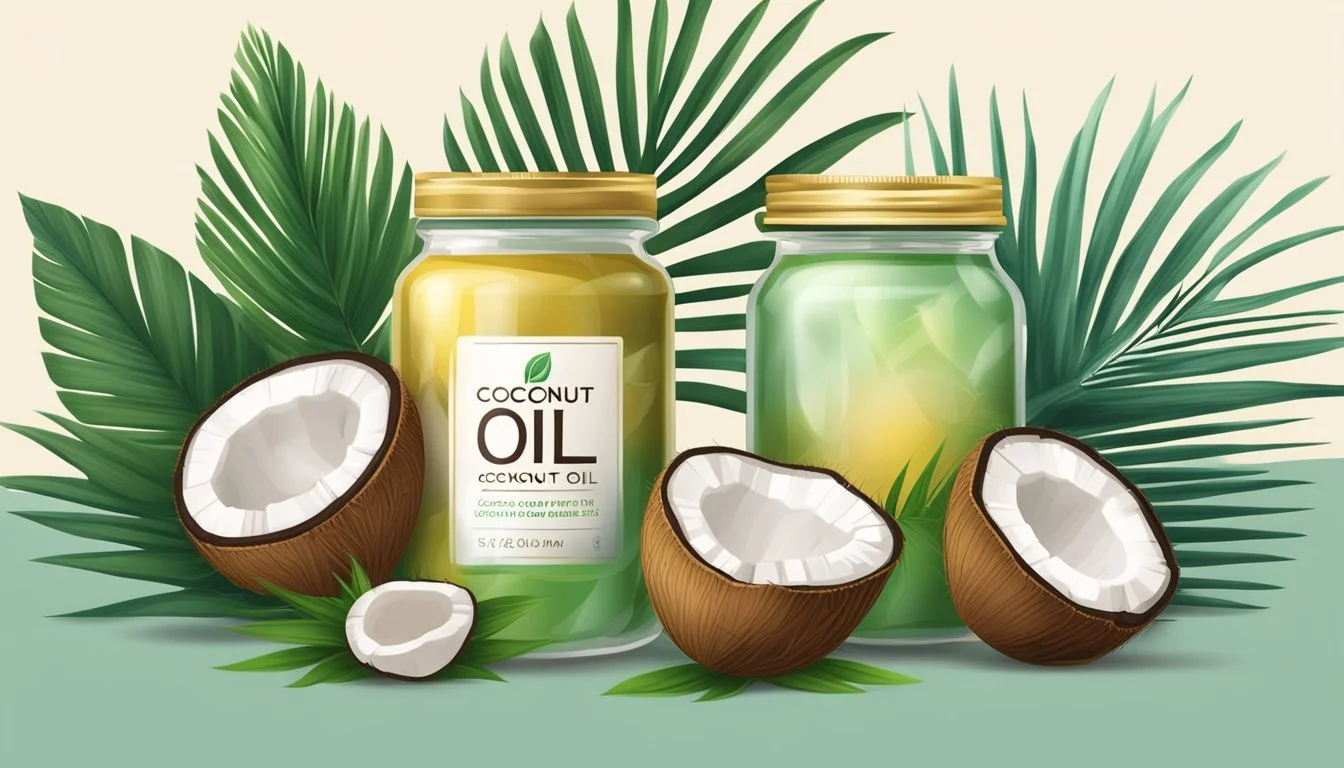Is Coconut Oil Vegan?
Unraveling the Truth About This Popular Oil
Coconut oil has become a staple in many kitchens due to its versatility and unique characteristics. It is extracted from the meat of coconuts, a process that involves pressing the coconut meat to yield oil. The popularity of coconut oil is not just attributable to its flavor and high smoke point, which make it suitable for frying and baking, but also to its acceptance within vegan communities as a plant-based product.
Vegans look for products that do not involve animal exploitation or animal-derived ingredients, making coconut oil an attractive option. Its status as a vegan-friendly ingredient is clear since it is sourced from a plant and not an animal. However, when considering coconut oil's vegan status, it is not only the origin of the product that matters but also the production process. Though typically vegan, some vegans may take into account ethical considerations regarding how the coconuts are harvested, which could influence their buying decisions.
The discussion around coconut oil also delves into health aspects, comparing it to other plant oils and considering its content of phytosterols, which are lower compared to oils like flaxseed and rapeseed. Despite these nutritional considerations, for those following a vegan lifestyle, coconut oil remains a commonly used fat source in vegan cooking, due to its plant-based origin and the absence of animal-derived components.
Understanding Veganism
Veganism is more than a diet; it's a practice emphasizing ethical, health, and environmental considerations. It has a focused definition and core principles, prioritizes certain dietary essentials, and is deeply rooted in ethical deliberations regarding animals and the environment.
Definition and Principles
Veganism is defined as a way of living that seeks to exclude, as far as possible and practicable, all forms of exploitation of, and cruelty to, animals for food, clothing, or any other purpose. The principles of veganism extend beyond dietary choices to include clothing, cosmetics, and other products. Vegans aim to reduce the impact of animal agriculture on the environment, which includes combating habitat loss and protecting animal rights.
Core Principles:
Avoidance of animal products
Reduction of animal cruelty and suffering
Promotion of plant-based alternatives
Consideration of environmental sustainability
Vegan Diet Essentials
A vegan diet consists of foods derived from plants, avoiding meat, dairy, eggs, and other substances obtained from animals. Essential components of a vegan diet include:
Fruits and Vegetables: Rich in vitamins, minerals, and fiber
Legumes: A good source of protein and nutrients
Nuts and Seeds: Provide essential fatty acids and protein
Whole Grains: Vital for energy and digestive health
These elements form the foundation of a nutritionally complete plant-based diet, essential for maintaining health and vitality.
Ethical Considerations in Veganism
Ethical considerations in veganism are centered around the belief that all sentient beings have a right to life and freedom. Therefore, vegans typically oppose animal agriculture due to concerns about animal cruelty, animal rights, and the environmental damage it causes.
Ethical Points:
Opposition to animal cruelty and exploitation
Fighting against environmental damage caused by animal agriculture
Advocating for animal rights and their welfare
Reducing habitat loss and preserving biodiversity
In essence, veganism propels change towards more ethical treatment of animals and the environment, highlighting the interconnectedness of dietary choices and broader ethical issues.
Coconut Oil Basics
Coconut oil is an edible oil extracted from the kernel or meat of mature coconuts. It is a fat that has been widely discussed in health and nutrition circles due to its unique composition of fatty acids, which includes medium-chain triglycerides. This section will explore the types of coconut oil available, their nutritional profiles, and the health impacts associated with their consumption.
Types of Coconut Oil
Refined Coconut Oil: Refined coconut oil is produced from dried coconut meat and may undergo bleaching or deodorizing to create a neutral taste and smell. Its high smoke point makes it suitable for cooking at high temperatures.
Unrefined Coconut Oil: Also known as virgin or extra-virgin coconut oil, this type maintains its natural flavor and aroma. It is extracted from fresh coconut meat without the use of high temperatures or chemicals, preserving its nutritional values.
Nutritional Profile
Coconut oil is high in saturated fats, specifically lauric acid, which contributes to over 50% of its fatty acid content. Unlike long-chain fatty acids found in animal fats, the medium-chain fatty acids (MCFAs) in coconut oil are metabolized differently:
Lauric Acid: A medium-chain fatty acid that can have a more neutral impact on cholesterol levels.
Medium-Chain Fatty Acids (MCFAs): Include caprylic and capric acids, believed to be processed by the liver, potentially aiding in energy production and weight management.
Fatty Acid Type Percentage in Coconut Oil Saturated Fat 80-90% Medium-Chain Fatty Acids Significant Amount
Health Impacts
Cholesterol Levels: Coconut oil's impact on cholesterol is complex, with lauric acid raising HDL (often termed 'good' cholesterol) but also potentially raising LDL (known as 'bad' cholesterol) due to its high saturated fat content.
Weight Management: Some studies suggest that MCFAs in coconut oil can help in weight management due to their role in satiety and energy expenditure.
Healthy Fats: While coconut oil is high in saturated fats, not all health experts agree on its designation as a 'healthy' fat. It is generally recommended to consume it in moderation within a balanced diet.
The health impacts of coconut oil are a subject of ongoing research, making it a hotly debated topic in nutrition science. Consumers are encouraged to stay informed about the latest findings to make educated dietary choices.
Coconut Oil in Vegan Cooking
Coconut oil has established itself as a culinarily versatile and vital ingredient within vegan cooking, offering a range of functionalities from frying to baking. It is particularly lauded for its ability to emulate the richness of butter, making it an indispensable asset in vegan kitchens.
Culinary Uses
In vegan culinary practices, coconut oil is multifaceted. It can be employed in various cooking methods such as:
Frying: Ideal for frying due to its stability at high temperatures.
Sauteing: Adds a sublime texture to vegetables and other plant-based ingredients.
Baking: Commonly used in recipes to provide moisture and binding properties.
The utility of coconut oil extends to its role in enhancing vegan recipes, where it serves not only as a basic ingredient but also a transformative agent that can significantly elevate the final dish.
Substituting for Animal Products
Coconut oil is an excellent replacement for dairy products in vegan cooking. Specific substitutions include:
Butter in Baking: Equal parts of coconut oil can often replace butter to create flaky biscuits and pastries.
Cream in Desserts: When whipped, coconut oil can mimic the texture of dairy cream for use in frostings and other confections.
These substitutions are particularly relevant in vegan baking, where the exclusion of animal products is essential. Coconut oil's versatility makes it a staple in any vegan pantry.
Texture and Flavor Enhancements
Coconut oil significantly contributes to the texture and flavor profiles of vegan dishes. Characteristics include:
Texture: It can produce a creamy texture in frostings or a flaky consistency in baked goods.
Flavor: For those desiring a subtler taste, refined coconut oil imparts minimal coconut flavor, whereas unrefined coconut oil can infuse a rich, coconut essence.
Vegan-friendly coconut oil thus serves not only as a functional cooking ingredient but also as a means to enrich and diversify the organoleptic aspects of vegan cuisine.
Ethical Sourcing and Sustainability
The production of coconut oil warrants scrutiny from ethical and sustainable perspectives, considering the treatment of workers, environmental impact, and choices of brands that prioritize these concerns.
Production and Harvesting
Coconut oil is derived from the coconut flesh, typically via methods that require careful labor. The ethics of harvesting methods are a significant concern, especially when it comes to potential exploitation of workers. Sustainable and ethical harvesting practices ensure that local communities are responsibly supported, and that labor rights are upheld. Additionally, the presence of certifications can serve as a proxy for ethically-made products.
Environmental Impact
The environmental impact of coconut oil production encompasses factors such as habitat loss and the number of species threatened by agricultural expansion. Sustainable practices help to mitigate these impacts, preserving forests and the ecosystem services they provide. Conscious production methods aim to reduce environmental damage and support the longevity of forest ecosystems, which are crucial for the planet's health.
Choosing Ethical Brands
When selecting coconut oil products, consumers should seek out brands that are transparent about their sourcing and are committed to sustainability and ethical considerations. Certifications like cruelty-free labels and organic standards can guide consumers towards products that align with their values. These brands often invest in sustainable practices, promoting coconut oil that is responsibly produced without compromising ethical integrity.
Versatility in Non-Dietary Uses
Coconut oil's utility extends far beyond the kitchen, playing a significant role in cosmetics and various non-cooking applications due to its nourishing properties and ethics of cruelty-free sourcing.
Coconut Oil in Cosmetics
Coconut oil is highly regarded in the beauty industry for its moisturizing benefits. When used on the face, it acts as an emollient, helping to soften the skin. Many vegan-friendly cosmetics incorporate coconut oil for its natural fatty acids and compatibility with sensitive skin. Cruelty-free products often feature coconut oil as a key ingredient, aligning with ethical consumerism by avoiding animal testing.
Other Non-Cooking Applications
Apart from cosmetics, coconut oil has several other applications. Its use in the production of candles and soaps is well-recognized, where it contributes to a longer burn time and a lather that is both rich and moisturizing. In addition, with its natural antimicrobial properties, coconut oil is used in homemade deodorants, offering a vegan-friendly alternative to traditional products. It is also favored in the making of various salves and balms for its protective qualities.
Frequently Asked Questions
This section provides targeted responses to common queries surrounding coconut oil within a vegan diet, its health aspects, culinary uses, and significance in vegan lifestyles.
Health-Related Queries
Is coconut oil a healthy choice for those on a vegan diet? Coconut oil is a plant-based fat with a unique composition of medium-chain fatty acids. Although it is vegan and can be included in a vegan diet, it is high in saturated fat. Consumers should consider its nutritional profile in the context of their overall diet.
Nutritional Facts: High in saturated fat; contains no cholesterol
Health Considerations: Should be consumed in moderation within a balanced vegan diet
Culinary Questions
Can coconut oil be used in vegan recipes and what are its benefits? Coconut oil is versatile in vegan cooking due to its flavor and high smoke point. It imparts a subtle, tropical taste to dishes and is ideal for frying, baking, and as a dairy butter alternative.
Cooking: Excellent for sautéing and frying; smoke point around 350°F
Vegan Baking: Can replace butter to add moisture and richness in vegan baking recipes
Vegan Lifestyle Guidance
What role does coconut oil play in plant-based living and are there any ethical concerns? Coconut oil is frequently used in a vegan lifestyle, serving as both a food ingredient and in personal care products. Shoppers aiming for ethical consumption should seek out ethically sourced coconut oil, ensuring it is produced without animal exploitation.
Vegan Diet: A staple for flavor and texture in an array of vegan dishes
Alternatives: For those concerned with fat content, alternatives may include other plant oils or fat sources.
Conclusion
Coconut oil is a product extracted from the flesh of coconuts and, by its plant-based origin, fits within a vegan diet. It does not involve the use of animal products or by-products in its essential processing. Those adhering to veganism can use coconut oil confidently knowing it is a suitable addition to their lifestyle.
The benefits of coconut oil are varied. It is a versatile ingredient in vegan cooking and baking, serving as a dairy-free alternative to butter. Coconut oil is also utilized in vegan cosmetic products due to its moisturizing properties.
In the interest of balance, it is important to acknowledge the environmental and ethical considerations associated with coconut oil production. Some might argue that certain harvesting methods raise concerns about sustainability and the welfare of workers or animals, such as monkeys reportedly being used to pick coconuts. Consumers are encouraged to research brands and opt for those with transparent, ethical sourcing practices.
In summary, coconut oil itself is inherently vegan. Vegans can incorporate it into their routine, benefiting from its culinary and cosmetic applications. However, an informed choice also considers the broader impact of its production, prompting vegans to seek sustainably sourced and ethically harvested coconut oil.







